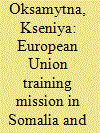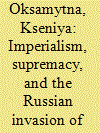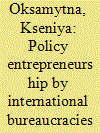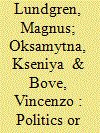|
|
|
Sort Order |
|
|
|
Items / Page
|
|
|
|
|
|
|
| Srl | Item |
| 1 |
ID:
184651


|
|
|
|
|
| Summary/Abstract |
Contemporary peacekeeping operations carry out many disparate tasks, which has triggered a debate about “Christmas Tree mandates.” Did the UN Secretariat or the UN Security Council drive this expansion? Using original data on nineteen UN peacekeeping missions, 1998–2014, this article compares peacekeeping tasks recommended by the Secretariat to those mandated by the Council. It finds that the two bodies expressed different preferences regarding the nature, number, and novelty of peacekeeping tasks. First, the Council dropped Secretariat-recommended tasks as often as it added new ones on its own initiative. Second, the two bodies disagreed more over peacebuilding and peacemaking tasks than over peacekeeping tasks. Third, the Council preferred to be the one to introduce novel tasks that had not appeared in previous mandates. Finally, among the countries that “held the pen” on peacekeeping resolutions, the United States was the most prone to dropping Secretariat-proposed tasks and the least willing to add tasks itself.
|
|
|
|
|
|
|
|
|
|
|
|
|
|
|
|
| 2 |
ID:
109189


|
|
|
|
|
| Publication |
2011.
|
| Summary/Abstract |
The European Union Training Mission (EUTM) in Somalia, the EU's mission to contribute to the training of the Somali Security Forces, was deployed in April 2010 and extended for another 12-month period in July 2011. Despite the positive assessment of the outcome of the first training period, the overall feebleness of Somalia's Transitional Federal Government puts the political feasibility of the mission into question. EUTM Somalia can be subjected to many of the same criticisms as the liberal peacebuilding agenda in general for trying to contain rather than resolve conflict and maintaining a top-down perspective which ignores organic, indigenous local structures.
|
|
|
|
|
|
|
|
|
|
|
|
|
|
|
|
| 3 |
ID:
192526


|
|
|
|
|
| Summary/Abstract |
Few predicted the Russian full-scale invasion of Ukraine and especially its brutality. Similarly, Ukraine’s capable and determined resistance came as a surprise to many. Ukraine, viewed through the Russian lenses, was erroneously characterized as “weak” and “fragmented.” In turn, Russia was seen as a modern power seeking a “sphere of influence” through attraction and occasional meddling in neighbors’ affairs. The Ukraine–Russia relations were misconstrued as “brotherly.” I argue that Russia should be understood as a colonial power whose aggression aims to re-establish supremacy over the Ukrainian nation. This desire arose from Ukrainians' increased acceptance in Europe, which Russians perceived as a transgression of hierarchies. The brutality of the invasion was aggravated by the Russian forces’ realization that Ukrainians not only rejected their “rescue mission” but did not need one in the first place. Misconceptions about the Russian invasion can be addressed through interdisciplinarity, engagement with postcolonial scholarship, and attention to facts.
|
|
|
|
|
|
|
|
|
|
|
|
|
|
|
|
| 4 |
ID:
165111


|
|
|
|
|
| Summary/Abstract |
In spite of being a multi-billion-dollar undertaking fundamentally reshaping the lives of people around the world, UN peacekeeping has only recently started to attract scholarly attention among a broader audience. While the evolution of norms and practices in other international organizations, such as the World Bank, the IMF, or the UNHCR, has been extensively analyzed, the transformation of peacekeeping operations has been no less significant.
|
|
|
|
|
|
|
|
|
|
|
|
|
|
|
|
| 5 |
ID:
158028


|
|
|
|
|
| Summary/Abstract |
The UN Secretariat’s role in the expansion of peacekeeping after the cold war is debated. Different theoretical accounts offer competing interpretations: principal–agent models and sociological institutionalism tend to emphasize the Secretariat’s risk-averse behaviour; organizational learning scholarship and international political sociology find evidence of the Secretariat’s activism; constructivism analyses instances of both. I argue that the UN Secretariat can be both enthusiastic and cautious about new tasks depending on the circumstances and the issue area. For example, UN officials have been the driving force behind the development of public information campaigns by peacekeeping missions aimed at the local population. During the cold war, it was not regarded as necessary for UN missions to communicate with the public in the area of operation: their interlocutors were parties to the conflict and the diplomatic community. With the deployment of the first multidimensional missions in the late 1980s and the early 1990s, UN staff realized the need to explain the organization’s role to the local population and provide information about UN-supported elections. In promoting this innovation, they played the role of policy entrepreneurs. The institutionalization of this innovation, however, was not an automatic process and required continuous advocacy by UN information staff.
|
|
|
|
|
|
|
|
|
|
|
|
|
|
|
|
| 6 |
ID:
183146


|
|
|
|
|
| Summary/Abstract |
International organizations face a trade-off between the need to replace poorly performing leaders and the imperative of preserving the loyalty of influential or pivotal member states. This performance-politics dilemma is particularly acute in UN peacekeeping. Leaders of peacekeeping operations are responsible for ensuring that peacekeepers implement mandates, maintain discipline, and stay safe. Yet, if leaders fail to do so, is the UN Secretariat able and willing to replace them? We investigate newly collected data on the tenure of 238 civilian and military leaders in thirty-eight peacekeeping operations, 1978 to 2017. We find that the tenures of civilian leaders are insensitive to performance, but that military leaders in poorly performing missions are more likely to be replaced. We also find evidence that political considerations complicate the UN’s efforts at accountability. Holding mission performance constant, military leaders from countries that are powerful or contribute large numbers of troops stay longer in post.
|
|
|
|
|
|
|
|
|
|
|
|
|
|
|
|
|
|
|
|
|